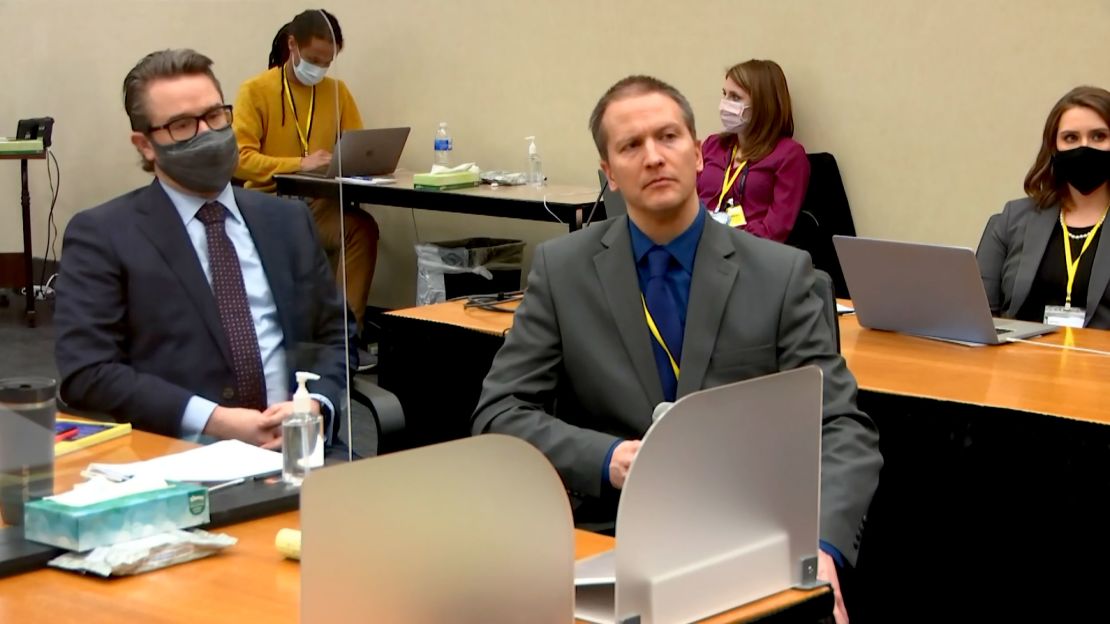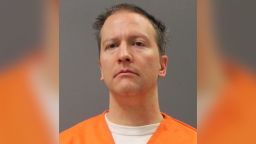Months after he was convicted of murder, former Minneapolis police officer Derek Chauvin pleaded guilty in federal court Wednesday to civil rights charges related to the death of George Floyd.
Chauvin also pleaded guilty in a separate federal case in which he was accused of depriving the rights of a 14-year-old in Minneapolis in 2017 for allegedly kneeling on the back and neck of a handcuffed, non-resisting teenager.
As part of the plea agreement, Chauvin faces a sentence of between 20 and 25 years in prison. Prosecutors requested that he be sentenced to 25 years in prison to be served concurrently with his current 22 and a half year sentence on state murder charges.
“Defendant Chauvin has pleaded guilty to two federal civil rights violations, one of which led to the tragic loss of George Floyd’s life,” Attorney General Merrick Garland said in a statement. “While recognizing that nothing can repair the harm caused by such acts, the Justice Department is committed to holding accountable those who violate the Constitution, and to safeguarding the civil rights of all Americans.”
The guilty plea came nearly 18 months after the former officer held his knee on Floyd’s neck and back for 9 minutes and 29 seconds while the 46-year-old Black man, handcuffed and lying prone in the street, gasped for air and told Chauvin and other officers, “I can’t breathe.” Floyd’s death on May 25, 2020, sparked protests nationwide against police brutality and racial injustice.
In April, Chauvin was convicted of second-degree unintentional murder, third-degree murder and second-degree manslaughter for Floyd’s death and was sentenced to 22 and a half years in state prison. Under Minnesota law, Chauvin will have to serve two-thirds of his sentence, or 15 years, and then will be eligible for supervised release for the remaining seven and a half years.
Separate from his state murder case, Chauvin was charged in two federal indictments related to his policing. He had pleaded not guilty to the federal charges in September.
But on Wednesday, Chauvin appeared in federal court in St. Paul, Minnesota, dressed in an orange jumpsuit, and admitted guilt. The hearing was not captured on video because cameras are not allowed in federal court.
Assistant US Attorney Allen Slaughter asked Chauvin to confirm details included in the plea agreement, specifically whether Chauvin held Floyd down on the ground even after Floyd became unresponsive.
“Correct,” Chauvin said to each question asked by the prosecutor.
US District Court Judge Paul Magnuson has not yet set a date for Chauvin’s sentencing.
Members of the Floyd family were present in the courtroom, as was the unidentified juvenile Chauvin admitted to assaulting in 2017. According to the pool reporter inside court, Floyd’s brother Philonise Floyd turned to the juvenile after the hearing and said, “It’s a good day for justice.”
A first time admitting guilt

The guilty plea represents the first time Chauvin has publicly admitted his role in Floyd’s death, after he had pleaded not guilty to the state murder charges and exercised his right not to testify at trial.
Speaking outside of court, Philonese Floyd told CNN of the importance of Chauvin’s guilty plea.
“To me, this is big, because a blue wall fell, and it never falls,” he said. “It makes me feel better knowing that he is going be held accountable for what is going on.”
Other family members said they believed Chauvin pleaded guilty only because he had no other choice.
“I’m still feeling the same pain (and) anger I felt in the beginning, because he could have did this last year, started this on that day,” said Rodney Floyd, another one of Floyd’s brothers. “So today is the same pain.”
Terrence Floyd, another brother, said hearing the guilty plea “made me feel like, finally, you took accountability.”
“When he was pleading guilty, I know he knows why,” he said. “The fact still remains that he’s actually going to be in prison and he’s going to do time for what he did, so that’s good enough for me.”
The family’s civil rights attorney Benjamin Crump, Antonio Romanucci and Jeff Storms said the guilty plea was part of a historic day.
“While in many ways today is a victory for the interest of justice, we will never forget its cost,” they said.
Minnesota Attorney General Keith Ellison, who led the murder case against Chauvin, issued a statement on the importance of the guilty plea.
“Today, Derek Chauvin took responsibility and admitted his guilt in open court, under penalty of perjury, for depriving George Floyd and a boy, then just 14 years old, of their civil rights. This is important and historic. His admissions mark another important moment of accountability and another step on the road to justice,” he said.
He also thanked the US Attorney’s Office for the District of Minnesota and the Department of Justice for bringing the case.
“George Floyd’s life mattered. That young man’s life matters. Nobody is above the law, and nobody is beneath it. While Floyd’s life is lost to his family and all of us, I hope Chauvin’s change of plea will mark a new beginning for equal justice under the law, respectful treatment for every person in our society, and greater trust in our system of justice,” Ellison said.
What the federal indictments alleged
The two federal indictments, unsealed in May, cover two separate incidents in which Chauvin knelt on a person who was handcuffed and lying prone on their stomach. At Chauvin’s murder trial, medical experts testified that this position limits a person’s ability to breathe in what’s known as positional asphyxia.
In the first federal indictment, Chauvin was accused of two counts connected to Floyd’s death, including depriving Floyd of his right to be free from “unreasonable seizure, which includes the right to be free from the use of unreasonable force by a police officer.”
The indictment also charges Chauvin and former officers Tou Thao, J. Alexander Kueng and Thomas Lane with deprivation of rights under color of law for allegedly failing to give Floyd medical aid, the indictment states. Thao and Kueng are also accused of failing to intervene in Chauvin’s use of unreasonable force, according to the federal indictment.
In addition, the second indictment relates to a similar incident in September 2017 in which Chauvin knelt on a 14-year-old in Minneapolis. The indictment stated that Chauvin held the teenager by the throat, struck him in the head with a flashlight and held his knee on the neck and upper back of the teenager even after the teen was lying prone, handcuffed and unresisting.
Thao, Kueng and Lane pleaded not guilty to the federal charges in September.
They have also pleaded not guilty to state charges of aiding and abetting second-degree murder and aiding and abetting second-degree manslaughter in Floyd’s death. That trial is currently set for March 2022.
Correction: A previous version of this story gave the wrong amount of time that Chauvin held his knee on Floyd's neck and back. It was 9 minutes, 29 seconds.
CNN’s Evan Perez and Adrienne Broaddus contributed to this report.
























